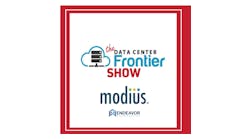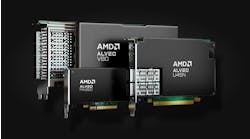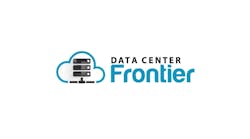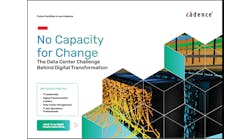In the past decade, the data center industry has grown rapidly, driven by a rising demand for cloud services and the widespread use of web-enabled devices. As we step into 2024, the rise in AI, machine learning, self-driving vehicles and high-performance computing has accelerated this growth to new heights. This race against demand is most evident in Northern Virginia, which for the past decade has been the world leader for data centers, and now faces challenges with data center sprawl and challenges to deliver the energy needed to sustain the demand.
In its quest to achieve proactive data center development, Quantum Loophole is developing its first master-planned data center community in Frederick, Maryland, dubbed Quantum Frederick. This carefully selected location capitalizes on Maryland’s close proximity to the Ashburn data center ecosystem and its strategic infrastructure benefits, including proximity to existing power transmission lines and access to recycled water solutions for customers’ data center cooling needs. Quantum Loophole's master-planned approach aims to harmonize the technical demands of modern data centers with the environmental and cultural expectations of the local community, establishing a new standard for future developments.
Maryland’s Strategic Appeal
Quantum Loophole’s selection of Frederick, Maryland, for its first master-planned data center community was a carefully considered strategic move designed to leverage the close proximity to Virginia’s bustling “Data Center Alley.” In doing so, Quantum Frederick also avoids the same challenges of data center sprawl and power constraints currently challenging that area. By master-planning its Frederick location, data centers can be built with growth in mind.
In the summer of 2020, Maryland launched its Data Center Maryland Sales and Use Tax Exemption Incentive Program. In doing so, the state opened its doors to invite data center developments into the state. This program underscored Maryland’s commitment to working with data centers and solidified it as a mutually beneficial opportunity for the state and data center community. Since the Data Center Incentive Program launched, the state government has continuously made strides to welcome the industry to Maryland.
This put the state on the map for Quantum Loophole, which evaluated parcels including a large swath of land previously owned by Alcoa. Further solidifying its interest in the 2,100+ acre land acquisition, Quantum Loophole came upon Frederick County’s forward-thinking Livable Frederick Master Plan (LFMP), ratified by the Frederick County Council in 2019. This plan, which laid out a strategic blueprint for sustainable community development, showcased Frederick County as an ideal location with its significant undeveloped land zoned for industrial use.
With Frederick County, Maryland, within less than a millisecond to the Ashburn ecosystem, Quantum Loophole designed and constructed the largest capacity fiber ring, QLoop, to directly connect its master planned data center community to the Ashburn ecosystem. When completed in mid-2024, QLoop, a 40(+/-) mile fiber network ring, will be able to offer over 235,000 strands of fiber to network operators, carriers and data center providers across its nearly 3.5 square mile development site in Maryland.
Eco-Friendly Initiatives and Environmental Concerns
Data centers are intensive facilities, and sustainability is of key importance for new development projects. Quantum Loophole's first master-planned data center community in Frederick, Maryland, showcases how technological innovation and the environment can work together harmoniously to provide benefits to local and state communities.
The former Alcoa-owned site, now home to Quantum Frederick, benefits from existing high criticality primary transmission lines. Taking advantage of this robust infrastructure decreases the required backup generator time in the event of an outage, thus reducing emissions. Quantum Loophole has also allocated 600+ acres to a nature reserve at Quantum Frederick to be utilized as a carbon sink and help the company achieve its goal in reaching carbon negative emissions. Moreover, Quantum Frederick will utilize recycled gray water — properly treated at a local treatment plant — for its customers’ cooling needs, ensuring the preservation of public water resources.
A data center community with the scope and vision of Quantum Frederick requires foresight and planning of robust infrastructure to support the existing and future needs of data centers without burdening the local community. The ambition in Frederick is to enable modernized infrastructure that is more reliable, scalable and conducive to the adoption of renewable energy sources to benefit not just the Quantum Frederick site but the wider Maryland community.
Community Collaboration
Quantum Loophole engages closely with the community to increase general awareness of data centers and their impact. Key advantages of the data center industry's growth include addressing the skilled labor shortage through workforce development and creating new career opportunities. Quantum Frederick is expected to contribute to increased tax revenue, significant infrastructure enhancements and further investments from the industry into local economies.
Quantum Loophole is dedicated to making meaningful connections and contributions to the community. In addition to supporting local community events, such as the Great Frederick Fair, Quantum Loophole has hosted parlor meetings with local constituents to engage more in one-on-one and group settings to answer and address questions about the development. Other activities include onsite visits such as ‘walk-n-talks’ that tour members of the community around the property to offer a full and immersive visual experience of what is underway in Frederick County.
Quantum Loophole is working to provide for the future of STEM education in Maryland through the Quantum Frederick scholarship Fund, which is available to students in Frederick County with financial need who are seeking higher education in a STEM field. High schoolers and middle school students in the area are being taught the history of the internet and the digital infrastructure industry through the Middle School STEM Match Program and Frederick High School’s LYNX Program. Through education and funding, Quantum Loophole plans to create long-term, positive impacts for Frederick County students.
Quantum Loophole’s Pioneering Role
Quantum Loophole is further positioning Maryland to be a key market in the data center industry. Through its educational and community-focused initiatives, the company is helping the people of Maryland understand what data centers can do for them and their state.
Quantum Frederick is the realization of a proactive master plan of data center development, and Maryland provides the optimal location to make it happen. From supporting local initiatives to funding education, Quantum Loophole is working to weave a thread in a tight-knit community. We’re doing what we can to be a part of the fabric that makes Frederick County one of the most desired places to live and work. Quantum Loophole believes the community and the industry can come together in a way to benefit both and bring all of us into the future of data centers.

Rich Paul-Hus
Rich is Senior Vice President at Quantum Loophole covering sales, public relations and lobbying. Rich formerly served as the CEO of HUSdigital LLC where he is responsible for strategy, business development and growth initiatives. On a mission to build a business based on two key areas: building a corporate culture that aligned team-member, customer and corporate interests; and attracting world-class talent to democratize data in the digital ad space.
Prior to taking on his role at HUSdigital, Rich gained experience in Whoop Wireless and then Hypower, where he served as SVP Business Development, helping to take the company from startup to over $100 million in annual revenue. Rich has given his time to numerous charitable and political entities throughout his career. He is a graduate of Stetson University and is married with four children.






